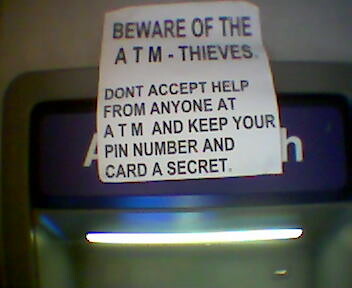 I hate grammatical redundancy. Some of the best examples of this are:
I hate grammatical redundancy. Some of the best examples of this are:- ATM Machine (Automated Teller Machine Machine)
- PIN Number (Personal Identification Number Number)
- ISBN Number (International Standard Book Number Number)
"But," said my buddy Dan, with a look of pure glee, "you say ATM Machine like everyone else, right?"
"I do not," I answered. And I don't.
"That's a dilemma," Dan said, still gleeful. "The English major part of you conflicting with the participatory culture theorist, who says that whatever the people decide is right."
He was ribbing me, but in truth it's a fair enough critique. After all, some of the most influential books on participatory culture and the social revolution include the following titles, all of which intentionally fly in the face of common attitudes toward morality, ethics, and human progress:
Here Comes Everybody (Clay Shirky)
The World is Flat (Thomas Friedman)
Wikinomics: How Mass Collaboration Changes Everything (Don Tapscott)
Tribes: We Need You to Lead Us (Seth Godin)
And, I'll just admit it, my blog is absolutely peppered with sweeping declarations: Print journalism isn't viable. Young people are leading the social revolution. The question isn't 'is it moral?', but 'is it popular?'
Why, after all, isn't the question 'is it moral?' Simply put, most of the time when people ask that question about aspects of the social revolution, what they're actually asking is more along the lines of 'is this better or worse than the experiences and culture I'm used to?' This is a matter of personal preference, and there's no accounting for taste.
Some of my friends think wearing a wristwatch makes it easier for them to make it to their meetings on time; some of my friends think watches just make them more time-conscious and anxious. If suddenly a critical mass of people started wearing watches and pressuring the rest of their culture to wear watches too, some of my friends would be thrilled (everybody will have to be on time now!), some would be upset (we're all going to start caring more about the time than about each other!), and some wouldn't care at all (*shrug* it's just another tool to help me get through my day.).
 Some people think online social networks signal the decline of community. Some people think new, valuable community structures have emerged around these networks. And some people just think online Scrabble is a fun way to spice up a boring work day. All of these people are right, but arguing about whether we're better or worse off (or the same) is pointless, because is a wristwatch-bearing culture better than one that uses sundials? Your answer depends on a lot of things, like: whether you make your living off of sundial manufacturing; whether you can personally afford a watch; whether you were someone who cared a lot about keeping track of the time in the first place; and whether you think a watch looks good on your wrist.
Some people think online social networks signal the decline of community. Some people think new, valuable community structures have emerged around these networks. And some people just think online Scrabble is a fun way to spice up a boring work day. All of these people are right, but arguing about whether we're better or worse off (or the same) is pointless, because is a wristwatch-bearing culture better than one that uses sundials? Your answer depends on a lot of things, like: whether you make your living off of sundial manufacturing; whether you can personally afford a watch; whether you were someone who cared a lot about keeping track of the time in the first place; and whether you think a watch looks good on your wrist.Please don't accuse me of absolute moral relativism, though; even participatory culture theorists have their limits. It's wrong to force everyone to wear wristwatches, for example, just as it's wrong to ban sundials. If democracy, freedom of the press, or free speech falter when print journalism hits its death throes, I will be among the throngs calling for social change. Participatory media platforms tend, as all previous platforms have, to silence certain groups (nonwhites, nonstraights, older participants, less educated [formally or informally] participants); this is painful and wrong.
And RAS syndrome will always be wrong, no matter what percentage of the population adopts the phrase "ATM machine."
Footnote upon the construction of the masses:
some people are young and nothing
else and
some people are old and nothing
else
and some people are in between and
just in between.
and if the flies wore clothes on their
backs
and all the buildings burned in
golden fire,
if heaven shook like a belly
dancer
and all the atom bombs began to
cry,
some people would be young and nothing
else and
some people old and nothing
else,
and the rest would be the same
the rest would be the same.
the few who are different
are eliminated quickly enough
by the police, by their mothers, their
brothers, others; by
themselves.
all that's left is what you
see.
it's
hard.
(Charles Bukowski, The Days Run Away Like Wild Horses over the Hills, 1969)






No comments:
Post a Comment